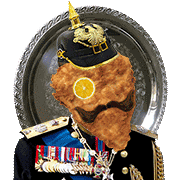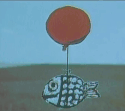|
Nebakenezzer posted:Was this docterine thing because of the Ju 52 being small, or was their doctrine always about dropping into defended airspace to take strong points? Exactly that. German doctrine was to aggressively jump right on top of the objective, whether using gliders or parachutes. (Think of the attack on Eben Emael for an example.) Allied doctrine was was to drop, often at night, then form up, then go for objectives. (Think D-Day.) That said, yes, it seems odd that "dropping aggressively right on top of the objectives" was combined with "drop without weapons." This was because they wanted to minimize the time spent exposed to anti-aircraft (and parachutist) fire as those objectives would inevitably be defended. So, again, they'd come in very low, land, then run to pick up their stuff and attack immediately. Whether or not this was a batter plan is up to debate.
|
|
|
|

|
| # ? Apr 19, 2024 20:06 |
|
KYOON GRIFFEY JR posted:are you seriously trying to argue that a tank production run is at all analogous to a rifle production run in terms of scale or magnitude? I think the argument is that there is a lot more factors in play about the length of production runs than the essential quality of a piece of equipment. For example, it could be too expensive to produce, you might hit shortages of some underlying material, or it could be replaced by another even better weapon, or - as in the case of both the Jumbo and the FG42 - it could be designed for some specific niche purpose like fortification busting or equipping airborne infantry that became less relevant as the war went on.
|
|
|
|
I'll also add that the German parachute design attached to the trooper by a single strap, resulting in almost a forward-learning posture and almost no control. Landings were hard, with the trooper tending to fall forwards onto knees and hands. I'm not sure if this was influenced by, or the one of the causes of the low-altitude jumping. Why this parachute design was chosen, I cannot tell you. Luftwaffe pilots used "normal" parachutes that had straps on each shoulder. If I'm wrong about this, please be gentle, Cessna
|
|
|
|
Grumio posted:If I'm wrong about this, please be gentle, Cessna No, this is entirely correct. Because the Germans dropped relatively low they went with a design that was simpler and opened faster, but wasn't as controllable. Less control wasn't seen as a drawback because they were already so low that they'd scatter less.
|
|
|
|
Cessna posted:Allied doctrine was was to drop, often at night, then form up, then go for objectives. (Think D-Day.) Worth noting that D-Day itself was such a disaster for the airborne troops it ended the night drops. Paratroopers ended up scattered over so wide of an area that for many it became functionally impossible to rally, and commanders were forced to make ad-hoc units out of whoever was in the immediate area at the time. While the overall operation was obviously a success, the challenges and risks imposed by dropping at night were made so abundantly clear that both Market Garden and Varsity, the two last big Allied Airborne operations of the war, were conducted during broad daylight—And of course, Market Garden would have its own cavalcade of issues. KYOON GRIFFEY JR posted:are you seriously trying to argue that a tank production run is at all analogous to a rifle production run in terms of scale or magnitude? It was a singular example off the top of my head, relax. And if you want an example of an infantry firearm that was good but only had a short production run, how about the M2 SMG? A very solid weapon that was clearly superior to the M1 Thompson it was supposed to replace, but production difficulties delayed introduction to the point that it ended up getting cancelled completely after it was superseded by the cheaper and more easily produced M3. Good videos on the subject by Forgotten Weapons: https://www.youtube.com/watch?v=08_mAlLrbTI https://www.youtube.com/watch?v=Nynxl9bgy9Q
|
|
|
|
Acebuckeye13 posted:Worth noting that D-Day itself was such a disaster for the airborne troops it ended the night drops. Paratroopers ended up scattered over so wide of an area that for many it became functionally impossible to rally, and commanders were forced to make ad-hoc units out of whoever was in the immediate area at the time. While the overall operation was obviously a success, the challenges and risks imposed by dropping at night were made so abundantly clear that both Market Garden and Varsity, the two last big Allied Airborne operations of the war, were conducted during broad daylight—And of course, Market Garden would have its own cavalcade of issues. Oh, absolutely. And, as stated, Crete (which used the German doctrine) was an absolute poo poo-show as well. I don't think there's a really good way to drop a big unit with parachutes in WWII; you just do it if the reward outweighs the losses.
|
|
|
|
Nebakenezzer posted:I was going through the old cold war thread looking for posts to highlight, and Cyrano wrote this in 2012 and I never really forgot about it because of his characteriztion of Hermann Goering: The invasion had a naval part too.
|
|
|
|
ChubbyChecker posted:The invasion had a naval part too. It's also worth remembering that a good number of the troops brought in by air weren't paratroopers; the 5th Gebirgsjager were mountain troops flown in by planes.
|
|
|
|
Cessna posted:Oh, absolutely. And, as stated, Crete (which used the German doctrine) was an absolute poo poo-show as well. I don't think there's a really good way to drop a big unit with parachutes in WWII; you just do it if the reward outweighs the losses. I think it was doable (Operation Varsity was certainly a success), but it required a LOT of specialized training, equipment, and planning to be successful—and by the time all those pieces had been developed and were put into place, the war was effectively over.
|
|
|
|
Cessna posted:Oh, absolutely. And, as stated, Crete (which used the German doctrine) was an absolute poo poo-show as well. I don't think there's a really good way to drop a big unit with parachutes in WWII; you just do it if the reward outweighs the losses. In the modern US military isn’t training regular infantry in parachute jumps pretty much an entirely a pride and inertia thing, and units like the 82nd and the rangers actually use helicopters in 99% of cases if they’re attacking from the air? Outside of special operations and obviously things like escaping a dying plane, the parachute seems like a strictly inferior option once you have better choices E: in somewhat milhist news, today is the 12th anniversary of that guy throwing his shoes at George W Bush. Never forgotten. Edgar Allen Ho fucked around with this message at 19:04 on Dec 15, 2020 |
|
|
|
Christmas shopping for my dad and he likes Civil War stuff-could anyone recommend me a particular version/edition of either Sherman or Grant’s memoirs, particularly one with maps/pictures? Is one more accessible than the other to the moderately interested but definitely not academic layman? Thanks!
|
|
|
|
Edgar Allen Ho posted:E: in somewhat milhist news, today is the 12th anniversary of that guy throwing his shoes at George W Bush. Never forgotten. Are the shoes on display somewhere?
|
|
|
|
Edgar Allen Ho posted:In the modern US military isn’t training regular infantry in parachute jumps pretty much an entirely a pride and inertia thing, and units like the 82nd and the rangers actually use helicopters in 99% of cases if they’re attacking from the air? IDK, they had a combat drop in OIF
|
|
|
|
Nenonen posted:Are the shoes on display somewhere? if I recall correctly there's a giant statue of a shoe in Tirkit that the town put up in his honor
|
|
|
|
KYOON GRIFFEY JR posted:if I recall correctly there's a giant statue of a shoe in Tirkit that the town put up in his honor Alas, it was taken down. 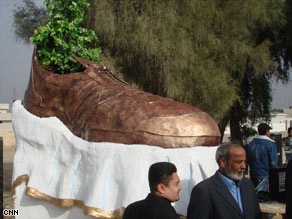
|
|
|
|
press f to pay respects
|
|
|
|
vuk83 posted:IDK, they had a combat drop in OIF And Urgent Fury. The original plan was for Rangers to land in C-130's at the army airfield, but mid-flight they learned that obstacles had been placed on the landing strip so they switched to a parachute landing, seizing the airfield and clearing the obstacles. In general there is still a purpose for parachute drops. You can just put so much more men or equipment on a cargo plane and have them move faster over a greater range, than with a helicopter fleet. Such capacity isn't needed that much outside a WW3 setting, but I would say there is somewhat of a 'fleet in being' thing going on. When you have the capability to suddenly drop entire divisions, with artillery and light vehicles (including light tanks and IFV's), anywhere, it forces your enemies to consider the potential threat to supposedly safe areas and keep substantial reserves.
|
|
|
|
C.f., Amphibious assaults.
|
|
|
|
vuk83 posted:IDK, they had a combat drop in OIF oh man, now there is a phrase hardly more deserving of "air quotes" as a qualifier. the OIF drop (by the 173rd Airborne) was infamous for its questionable necessity, and in fact forced a significant diversion of resources to resupply the self-isolated airborne troops, who dropped into an already-secured and cleared "enemy airfield" which was nothing but a single strip (no infrastructure- not even buildings). there are some recent examples of leveraging airborne forces to their strengths (Just Cause, as mentioned), but Northern Delay was not one of them.
|
|
|
|
Aren't HALO drops also a thing?
|
|
|
|
Raenir Salazar posted:Aren't HALO drops also a thing? For, like, a single CIA agent or a small handful of ODA dudes, maybe. Not for any large formations.
|
|
|
|
Carillon posted:For Christmas my father asked for either Special Providence: American Foreign Policy and How it Changed the World by Mead, or Albions Seed: Four British Folkways in America by David Hackett Fischer. Are they pretty good in terms of the arguments or are they chuddy/wrong/out-of-date? Quoting this dude because I'm always interested to hear people's opinions on various books.
|
|
|
|
I never read Alvion’s Seed, but I did read about a third of Washington’s Crossing by David Hackett Fischer. If I’d had less familiarity with the time I’d have liked it more. He doesn’t get anything wrong exactly but he accepts stories as true uncritically and reports legends as fact to make all the real facts fit together into a series of just-so stories. That might make it good for dad history, but I didn’t like it. 
|
|
|
|
Carillon posted:For Christmas my father asked for either Special Providence: American Foreign Policy and How it Changed the World by Mead, or Albions Seed: Four British Folkways in America by David Hackett Fischer. Are they pretty good in terms of the arguments or are they chuddy/wrong/out-of-date? It's structured as a comparative social/folkways history, and so for each of the four groups of settlers (Massachusetts Puritans, Tidewater Cavaliers, Pennsylvania Quakers, and Backcountry Scots) he goes through the same basic format-Foodways, language/dialect, Religion, building traditions, clothing specifics, marriage customs, naming customs, etc. etc. etc. There's alot of lists. It's probably of most interest to people interested in understanding how people thought and lived, and it is quite good at that. I have a much better idea of how the original British settlers of those colonies lived, thought, and understood the world than I did before reading it. It reinforced my belief that trying to understand people of the past on their own terms and as products of their place and time is a good way to look at history. Some of his observations on how the Tidewater gentry thought of 'liberty' and 'freedom' were especially enlightening w/r/t the founding of this country. Of the four cultures in the book, the Puritans in NE and the backcountry Scots have endured to the present most intact IMO, and 'clannish and independent backcountry lowland scots' vs 'cooperative New England puritans' is a useful lens to look at the current state of US politics (the author doesn't exactly-it was written in the late 1980s IIRC?), and there's plenty of echoes there going back 300 years.
|
|
|
|
Piggybacking off of that, The Radicalism of the American Revolution does a great job as well.
|
|
|
|
brains posted:oh man, now there is a phrase hardly more deserving of "air quotes" as a qualifier. IIRC it had also recently rained and most of the paratroopers ended up landing in plowed fields, so the first day was just them digging themselves out of hip-deep mud and then having the local Peshmerga drive them to the airstrip. On the upside the nice soft mud probably prevented some injuries from bad landings.
|
|
|
|
KYOON GRIFFEY JR posted:are you seriously trying to argue that a tank production run is at all analogous to a rifle production run in terms of scale or magnitude? The Jumbo was a small scale run from the start, it was supposed to be a specialized assault vehicle so nobody thought there would be a need for a lot of them. By the time they first saw battle and turned out to be incredibly useful in a wide variety of cases, production was long over with no plans to start it up again. The solution instead was to build the T26E5 assault tank based on the Pershing, but the war ended and it was never mass produced.
|
|
|
|
Cessna posted:Edit: Here's a famous photo of the drop on Crete. You can see how low those planes are: I'm going to assume the lower plane has deployed some kind of advanced and highly technical signal flare apparatus.
|
|
|
|
Platystemon posted:Looking at the relatively short time between the bombing of Dresden and V‐E day and concluding that bombing was worthless is a bit like looking at the timing between the atomic bombings and the Japanese surrender and concluding that America could have just waited six days and not needed the bombs. All of this discussion of Dresden is missing a lot of key context. 1) there was a much more destructive firebombing in Hamburg in 1943, with 58,000 deaths 2) the firestorms that make firebombings so destructive require, in Europe, large historic districts. You need a lot of narrow streets and wooden structures to create the firestorm. Hamburg was the biggest city in Germany where this would work. 3) because of where the firestorms were located, they didn't directly damage the factories, the sub pens, etc. The firebombings were monstrous and absolutely a war crime. Any miniscule help they contributed to the end of the war could have been achieved more easily and with less atrocity through other means. The only convincing argument that I've heard in favor of the strategic bombing campaign more broadly is the one advanced by Philips O'Brien: a huge proportion of the wehrmacht was devoted to dealing with the strategic bombers, which meant fewer enemies for the Soviets to have to deal with on the front.
|
|
|
|
I suppose when you have Joe ringing every other day paying for every inch back with lives the only thing you can appease him is by setting fire to cities and pounding indiscriminately.
|
|
|
|
Nebakenezzer posted:Yeah, sorry, I just noticed. So I was watching The Chieftains hatch video about the fall of France. And he stated that the Germans conducted the first ever air assault by having infantryman ride on airplanes that landed behind the French lines. Airborne at this point is a niche capability and was supplanted by helicopters once reliable turbine helicopters became a thing.
|
|
|
|
Why do so many African armies still have huge airborne contingents? Geography?
|
|
|
|
Nebakenezzer posted:Yeah, sorry, I just noticed. The Allies did a lot of this in Burma, where terrain did not facilitate large airborne drops but you could find or make rudimentary air strips to insert and resupply troops in the Japanese rear area. However, they were dedicating large amounts of their force to holding those air strips.
|
|
|
|
The use of gliders in WWII is so weird form a modern perspective.
|
|
|
|
Nebakenezzer posted:Yeah, sorry, I just noticed. The troops that took the Eben-Emael fort weren't parachute troops, but airborne combat engineers that landed on top of the fort in gliders.
|
|
|
|
Platystemon posted:The use of gliders in WWII is so weird form a modern perspective. When you don't have helicopters but still want to move things that are a bit heavy they look a lot better.
|
|
|
|
Platystemon posted:The use of gliders in WWII is so weird form a modern perspective. They're basically one-way helicopters as far as their use goes. The purpose was to put men in a single spot (rather than scattered like a para drop) with more and heavier equipment than you could manage with parachutes. The trade off was that you had to do it in a place that had a halfway clear LZ and where the gliders could land without getting shot to pieces. Obviously helicopters are just plain better at all this, but the broad strokes of why you'd use them and what you need to think about when employing them are similar.
|
|
|
|
poisonpill posted:Why do so many African armies still have huge airborne contingents? Geography? Airborne is also shorthand for elite light infantry at this point and I would imagine that at least for some African armies this is more about differentiation and ensuring loyalty to the regime than actual by-God Airborne operations.
|
|
|
|
 My people need me.
|
|
|
|

|
| # ? Apr 19, 2024 20:06 |
|
This bit reminded me of something I read recently:Nebakenezzer posted:Yeah, sorry, I just noticed. Which laid out how the Luftwaffe's pilot shortage did not begin with the Battle of Britain (closely followed by Barbarossa which took a heavy toll on the inadequate contingent of new pilots coming out of the training system to replace those lost in the BoB). It actually began with the Low Countries campaign and the widespread use of the Ju52 as a paratrooper platform. The Luftwaffe did not have enough experienced transport pilots to fly the number of Junkers proposed for the paratrooper campaign, and there was also pressure for new fighter pilots for the coming battles over France and Britain. So the Luftwaffe took would-be fighter pilots from the final stages of the training system and deployed them as co-pilots in Ju52s so they could get the required air-time before going to the operational training squadrons. Result? A large portion of the Luftwaffe's new fighter pilot contingent was lost as the Ju52 suffered heavy loses over the Low Countries, hollowing out the training system even before the losses of the Battle of Britain start biting. From spring 1940 the Luftwaffe was always playing catch-up with its fighter pilot numbers and never managed to make up the lost ground.
|
|
|














